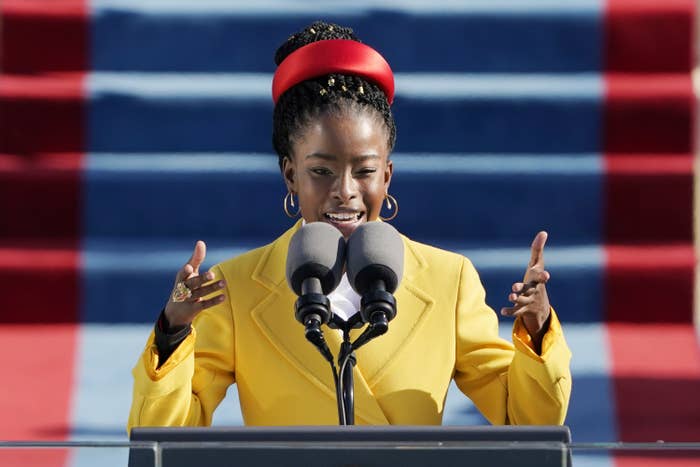22-Year-Old Amanda Gorman Will Be The First Poet To Ever Perform During A Super Bowl
Amanda Gorman, the young poet who grabbed the national spotlight at President Joe Biden's inauguration with her inspirational and powerful reading, will recite more of her work at Super Bowl LV.
According to an NFL list of past performances during Super Bowl half-time and pre-game shows, she will be the first poet ever to perform at the event, which is one of the most watched broadcasts in television.
At 22, Gorman became the youngest inaugural poet, and her poem "The Hill We Climb" confronted head-on the nation's violent division as it challenged Americans to work for unity and hope.
On Wednesday, the NFL announced the Los Angeles poet will recite a new poem before the official coin toss to recognize an educator, a nurse, and a veteran for helping their communities during the coronavirus pandemic, which has killed more than 425,000 people in the US so far.
The poem will be broadcast to a national audience on CBS, the NFL announced.
The new poem will honor Trimaine Davis, an educator who worked to secure electronic equipment for students, Suzie Dorner, an ICU nurse manager in Tampa, and James Martin, a Marine veteran who has worked to support fellow vets and high school athletes.
Davis, Dorner, and Martin will serve as the big game's honorary captains and take part in the coin toss ceremony in the middle of the field.
Gorman and her work skyrocketed to national acclaim after the Jan. 20 inauguration. Since then, she's appeared on national TV shows like Ellen, and her books shot into the top two slots on Amazon a day after her appearance in DC.
As she was working on "The Hill We Climb," Gorman told CNN's Anderson Cooper she had been studying the works of Frederick Douglass and Abraham Lincoln, master orators during times of great division in the US. But it was the violent insurrection at the Capitol on Jan. 6 that cemented the ultimate message of the work, she said.
"What it did is it energized me even more, to believe that much more firmly in a message of hope and unity and healing," she told Cooper. "I felt that was the type of poem I needed to write, and it was the type of poem that the country and the world needed to hear."












Post a Comment